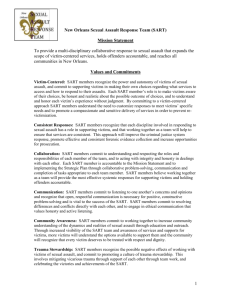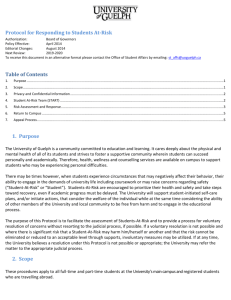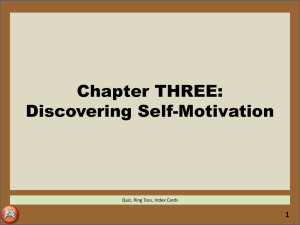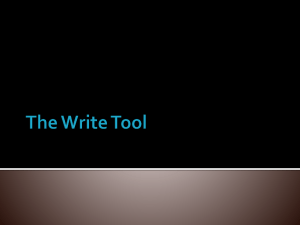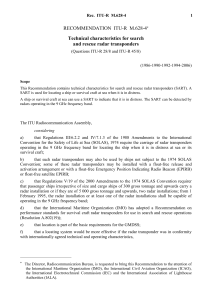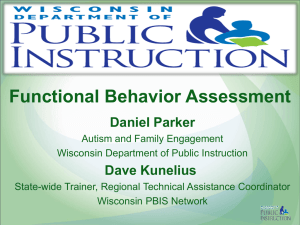Strategy Assessment - Ohio Center for Autism and Low Incidence
advertisement
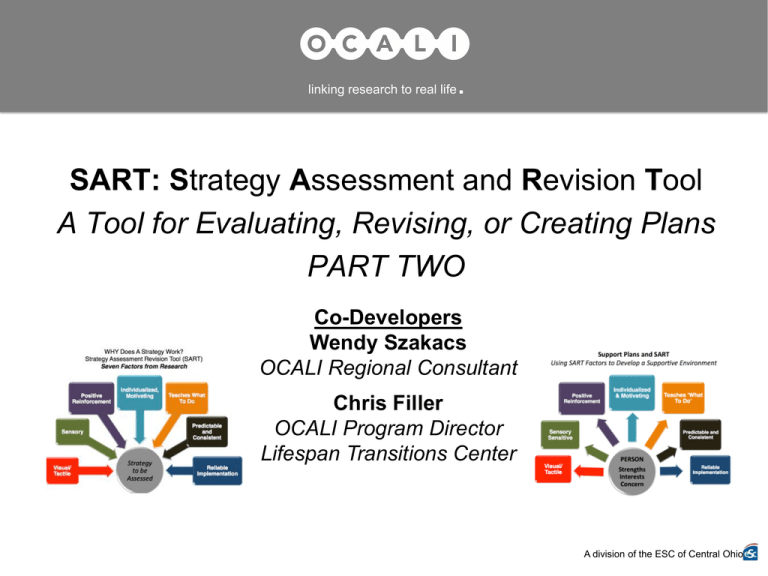
linking research to real life . SART: Strategy Assessment and Revision Tool A Tool for Evaluating, Revising, or Creating Plans PART TWO Co-Developers Wendy Szakacs OCALI Regional Consultant Chris Filler OCALI Program Director Lifespan Transitions Center A division of the ESC of Central Ohio WHY Does A Strategy Work? Strategy Assessment Revision Tool (SART) Positive Reinforcement Strategy to be Assessed • • • Build into the strategies/interventions Effective regardless of cognitive or communicative abilities EBP that increases the chance for positive outcomes Simonsen et al, 2008 and Retrieved http://autismpdc.fpg.unc.edu/content/rein forcement Discrete Trial Training (DTT) • • • • • Break behavior down into small steps Each step has a clear beginning, middle, and end Trials are repeated several times Child rewarded for correct answers/actions Can be done 1:1, in classrooms, in homes Positive Reinforcement in the Workplace Jack stocked shelves for a large department store. Although he was a hard worker, he could be very rude to the other employees and customers. The supervisors implemented a procedure in which Jack was not given any attention for rude behavior. However, when he was considerate to others, the supervisors and workers gave him special attention and tried to make him feel liked and appreciated. This procedure resulted in Jack engaging in much more thoughtful behaviors. Positive Reinforcement: Resources www.djfiddlefoundation.or g WHY Does A Strategy Work? Strategy Assessment Revision Tool (SART) Individualized, Motivating Strategy To Be Assessed • Learning is saturated with topics, items, and passions of the individual • Motivation is individualized within the tasks, activities, work Browder & Cooper-Duffy, 2003 and Simpson, 2005 REMINDER: Make sure communication supports are individualized for the person (style, method, and content) Special Interests Motivate Sing steps to task to help a person remember what to do Chores to include folding towels and handling other fabrics Use the most familiar and favorite music during the least motivating or favorite activities Provide access to music while doing chores or at work Have person carry favorite item (tactile item) when making difficult transitions ‘Person is interested in music and touching different textures’ New employment? Person not sure of a job? Search out employment that might allow sorting and organizing materials while listening to music in iPod or radio. Choices Are Motivating Pick who will be your partner for an activity Decide when to do the house chores Decide what to wear Decide what to eat and when Or…….. I want: Wine Beer Starbucks …….Adult Choices Juice Individualized & Motivating: Resources Power Cards: Using Special Interests to Motivate Children and Youth with AS and Autism By Gagnon Differentiated Instructional Strategies: One Size Doesn’t Fit All By Gayle WHY Does A Strategy Work? Strategy Assessment Revision Tool (SART) Teaches What To Do Strategy To Be Assessed • Direct, repetitive instruction of new skills that are part of strategies • Opportunities to practice new skills Bremer & Morocco, 2003, Flores & Ganz, 2007 and Browder & Cooper-Duffy, 2003 Video Modeling http://autismpdc.fpg.unc.edu/content/videomodeling Teach Expectations with Video Modeling • Integrate video clips of “modeled behavior” • Allows person to see and ‘study’ desired behavior • Studies promising How? •Cell Phone Video • Tablet Camera • YouTube Shower and Wash Hair • Showers are Good for You • Showers make You Clean • Wash Body and Hair • Friends Like You to Smell Clean Options for Alternatives for Challenging Behaviors Instead of This….. Screaming for Attention Grabbing everyone’s drink Try This…… Tap person’s arm Use sign language to ask for help getting a drink Hitting to tell someone ‘no’ Use words, sign language, gesture or picture to tell someone ‘no’ (and teach others to respect the message!) Hitting head with own fist to Use stress reducing alternatives such as deep relieve anxiety, stress, breathing, deep pressure, heavy blankets, frustration taking long walks…. Refusing to do a Teach the person how to do the job (maybe job/chore/task reduce the difficulty too….) Throwing items to escape from Use sign language, a visual symbol, gesture, the work or task picture, etc. to ask for a break Anxiety Support Self-Monitoring • Teach person how to track their own behavior/work • Develop system for tracking and teach to the student • Remember to reinforce progress The Hidden Curriculum • “The set of rules or guidelines that are often not directly taught but are assumed to be known.” • Phrases associated with hidden curriculum: “I shouldn’t have to tell you but …” “Everyone knows that …” “It’s obvious …” • Teach the Hidden Curriculum by reviewing the situations in the book, on the calendars, or that occur in everyday life. (Myles, et al., 2004, Endow, Mayfield, Myles, 2013) Teaches What To Do Resources Enhancing Everyday Communication for Children with Disabilities Sigafoos, et al Social Thinking Across the Home and School Day Winner
